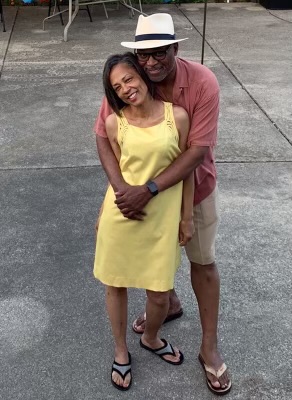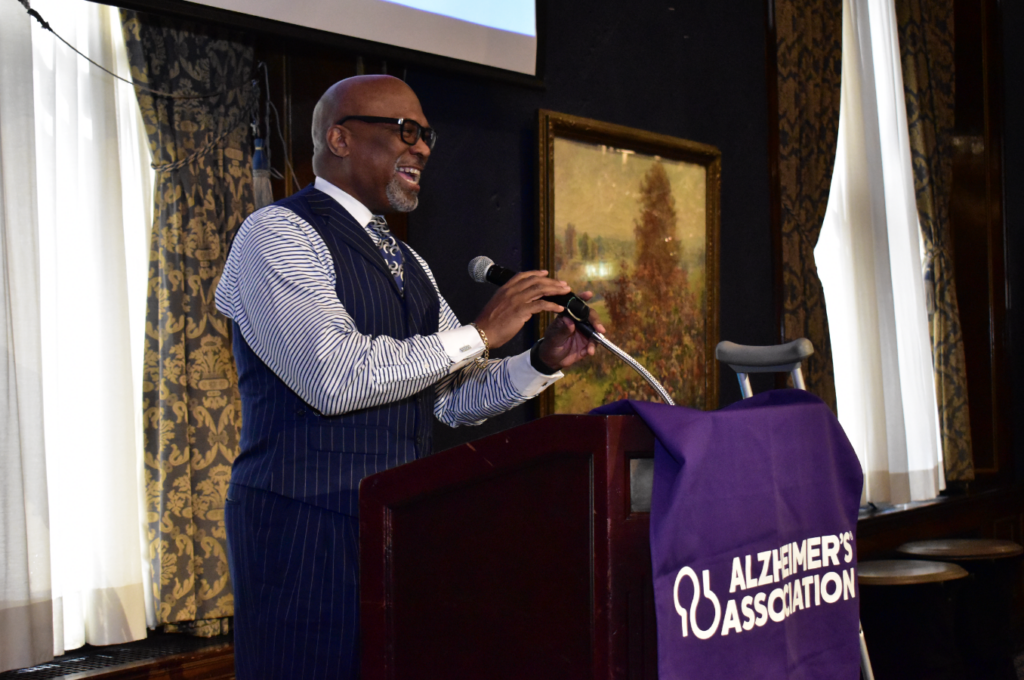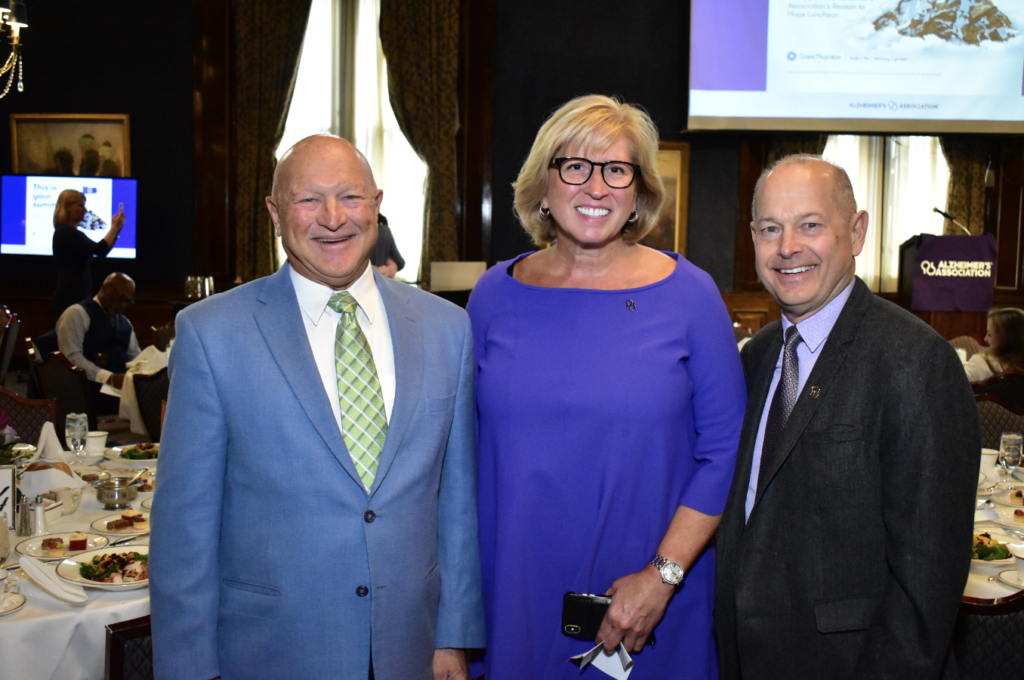The Alzheimer’s Association estimates that over six million people in the United States have Alzheimer’s disease or related dementia. Each of these people need care, and that care is frequently provided by over 11 million unpaid caregivers: spouses, siblings, children, or sometimes just concerned friends and neighbors. More than half of these caregivers are employed while at the same time devoting many hours every week to helping family and others who’ve been diagnosed with Alzheimer’s. These caregivers frequently report that they have had to arrive to work late, leave early and take time off to provide necessary assistance for people they care for, people they love.
Six in 10 caregivers were employed in 2023, most working 35 hours every week in addition to their caregiving responsibilities. Now, employers are starting to recognize and accommodate the physical and emotional stress experienced by those who provide care to others while remaining in the workforce.
On March 19, the Illinois Chapter of the Alzheimer’s Association is holding a luncheon, Power of Purple: A Reason to Hope, at the Four Seasons Hotel in Chicago. This event honors caregivers and recognizes those who are leading the fight against Alzheimer’s by bringing together corporations, foundations and individuals to increase awareness and raise funds for Alzheimer’s care, support and research. In case you’re wondering, the Alzheimer’s Association’s signature color is purple — which combines the stability of blue with the energy of red.
To better understand the impact the Alzheimer’s Association has on people’s lives, we spoke with several caregivers who told us their stories about the challenges of staying employed while caring for loved ones who’ve exhibited symptoms of Alzheimer’s.
James Gillian: “I was at my wits’ end. I called the toll-free number at two o’clock in the morning.”
James had taken a leave of absence from Fifth Third Bank, and he was thankful his employer had the flexibility to offer him that support while he took care of Gayle, his wife of 35 years, who had been diagnosed with Alzheimer’s. None of that was easy, but sometimes the hardest part is just knowing when to ask for help.
“It started with driving,” James recalls. “She never was the best driver. I told her, I said, ‘Girl, I don’t know what’s happening with your driving. But maybe, maybe you should stop driving.’ So, we went to Northwestern to the doctor, and they did the PET scan, and this was prior to us knowing what the heck was going on. They saw the plaque.” In the brain of an Alzheimer’s patient, abnormal levels of this protein clump together and interfere with cell function — it is referred to as plaque.

“I was determined that I was going to take care of her. But one night she was upset, really struggling. And it wasn’t the first time. She was angry, she was raging. I had to almost bear-hug her in bed to calm her down. I was at my wits’ end. So, I called the Alzheimer’s Association toll-free number at two o’clock in the morning. The guy answered right away, and he could hear her yelling. After I explained the situation, he said there was a possibility that she could have a UTI and that I might want to have that checked out in the morning, which I did. It turned out she probably did have a UTI, and we started her on antibiotics. The pain, the rage in the middle of the night, that all went away. But I’ll never forget making that call.”

Marilyn and Constance Lissner: “This is really something that can impact us all in some way.”
Marilyn’s son was diagnosed with early onset Alzheimer’s while still in his early fifties. A member of the Host Committee for Power of Purple: A Reason to Hope, Marilyn works with her daughter-in-law, Constance, the primary caregiver, to support her son, Stuart, through an increasingly difficult time.
“Everybody forgets,” says Marilyn, “but when you take it to that next level, you start to see how it can impact your very being. Not only are you losing a part of yourself, but you’re losing the people you love.”
“I started noticing little things,” remembers Constance. “But they became more glaring. The thing that I remember the most was he was setting the table for us at home. And he could not figure out where to put the placemats. And I remember getting really annoyed, thinking he was just not paying attention. And then I realized he could not process that information. To have a doctor say it was early onset Alzheimer’s was overwhelming.
“Whenever he walks out the door, I kind of brace myself, and I wait for him to come back. And I know there are just going to be lots of moments like that. I can’t imagine when it gets worse, what that will be like, how stressful it will be for him. And at what point do I have to let go of everything in my life to take care of him? I don’t know what that’ll feel like for either of us.
“I do enjoy working, and working is very important thing for me. I can work as much or as little as I want, and everyone in the company has been incredibly supportive. If I need help with anything, people can step up and take care of things. I do get my insurance through the company for myself and my younger son.
“I worry that one day, he’s going to wake up and he’s not going to know who I am. And it’s not going to come back. That will be it: I’ll have lost him. As our population begins to age significantly, and people live longer, and more people are getting Alzheimer’s, it’s important not just for us but for future generations to focus on getting to people early enough. We need to figure out what causes Alzheimer’s so we can stop it before it starts. The Alzheimer’s Association is helping to find a cure or at least find a way to postpone all the horrible things that I’m expecting to happen tomorrow.
“What was really important for me was to have an organization like the Alzheimer’s Association; it’s a tremendous resource.”
Amara Walker: “I never knew what it meant to live in the moment, until now. The present is truly a gift.”
Amara is a CNN anchor and correspondent, and she’s the featured speaker at the Power of Purple luncheon. Her mother is living with Alzheimer’s.
“I miss my dear mom so much sometimes,” Amara says. “I miss holding my mom’s hand, walking through the mall on one of my many visits back home to California; our conversations would range from fashion to the myriad of life lessons she had for me. I miss our long phone calls and her longingly asking when — and if — I would ever move back home to California. She occasionally exhibits these traits now and then, but with Alzheimer’s, time is our enemy and it’s chipping away at her essence.
“I miss my mom being my mom, annoying me with unsolicited feedback, or incessantly worrying about me. She was my best friend, therapist and advisor all in one. I hate talking about my mom in the past tense. She’s still here with us, but as she battles moderate-stage Alzheimer’s, I know things will never go back to the way they used to be.
“It’s not all about me. My dad, who is 80 years old, selflessly cooks every meal, bathes my mom, makes sure she brushes her teeth and takes her medications. Caring for my mom undoubtedly takes a toll on him both physically and emotionally. My brother and I try to be there for him as much as we can. I know my mom would be grateful if she knew our family is closer than ever, despite our grief.
“My mom always told me her happiest moments have been with her children. I’m so grateful her joy is still evident when we are together. I never knew what it meant to live in the moment, until now. The present is truly a gift. I love you, Mom.”
What You Can Do
Attend the Power of Purple: A Reason to Hope luncheon and get to know people who provide care for those with Alzheimer’s and those who support those caregivers. You can help provide assistance to these people, and this event celebrating them, with a gift that will be matched by the Make It Better Foundation.

More Ways to Help:
The Alzheimer’s Association leads the way to end Alzheimer’s and all other dementia — by accelerating global research, driving risk reduction and early detection, and maximizing quality care and support. Assist their life-changing work by donating, advocating or volunteering. Read more about your options online at Alzheimer’s Association.


